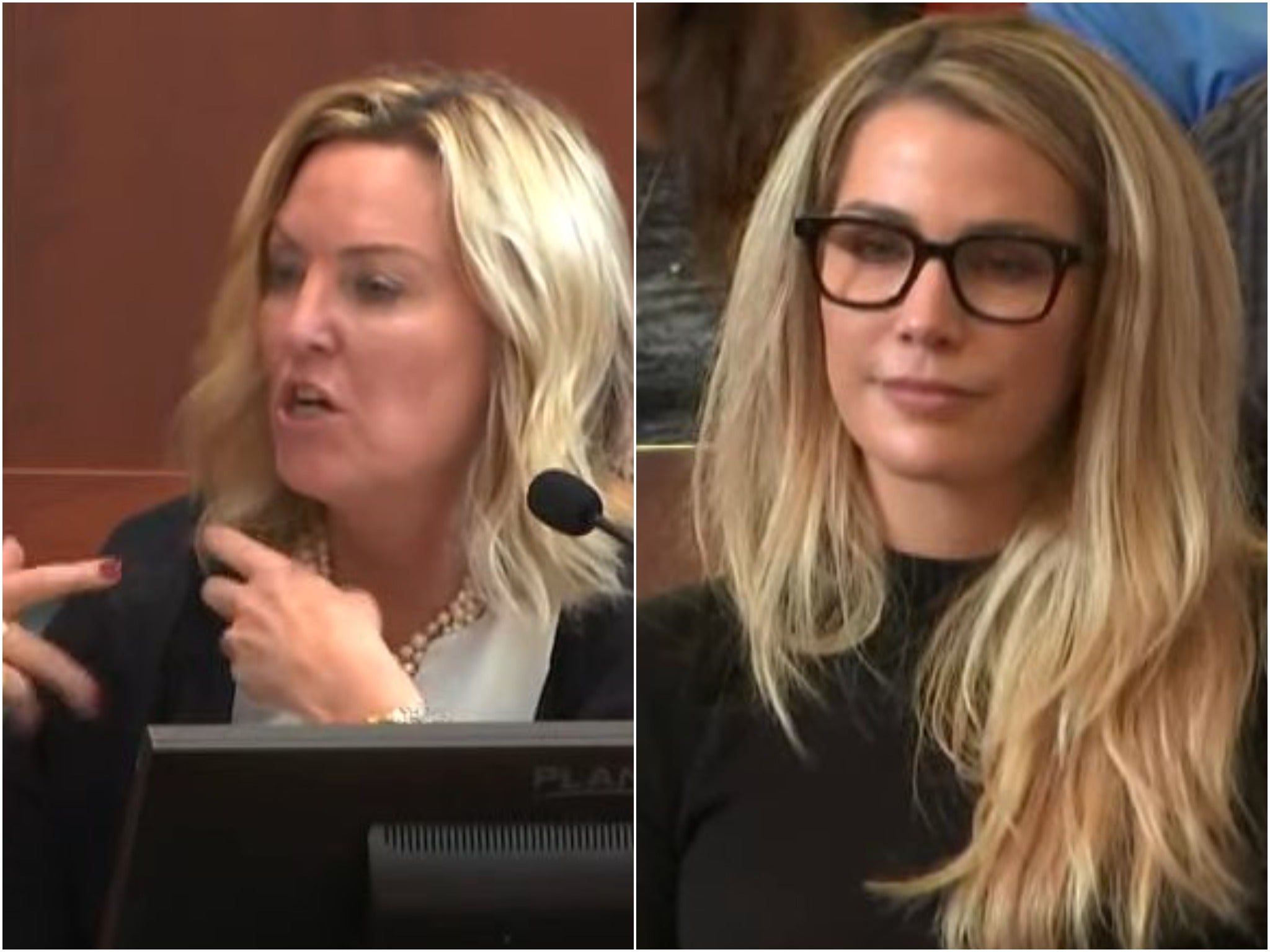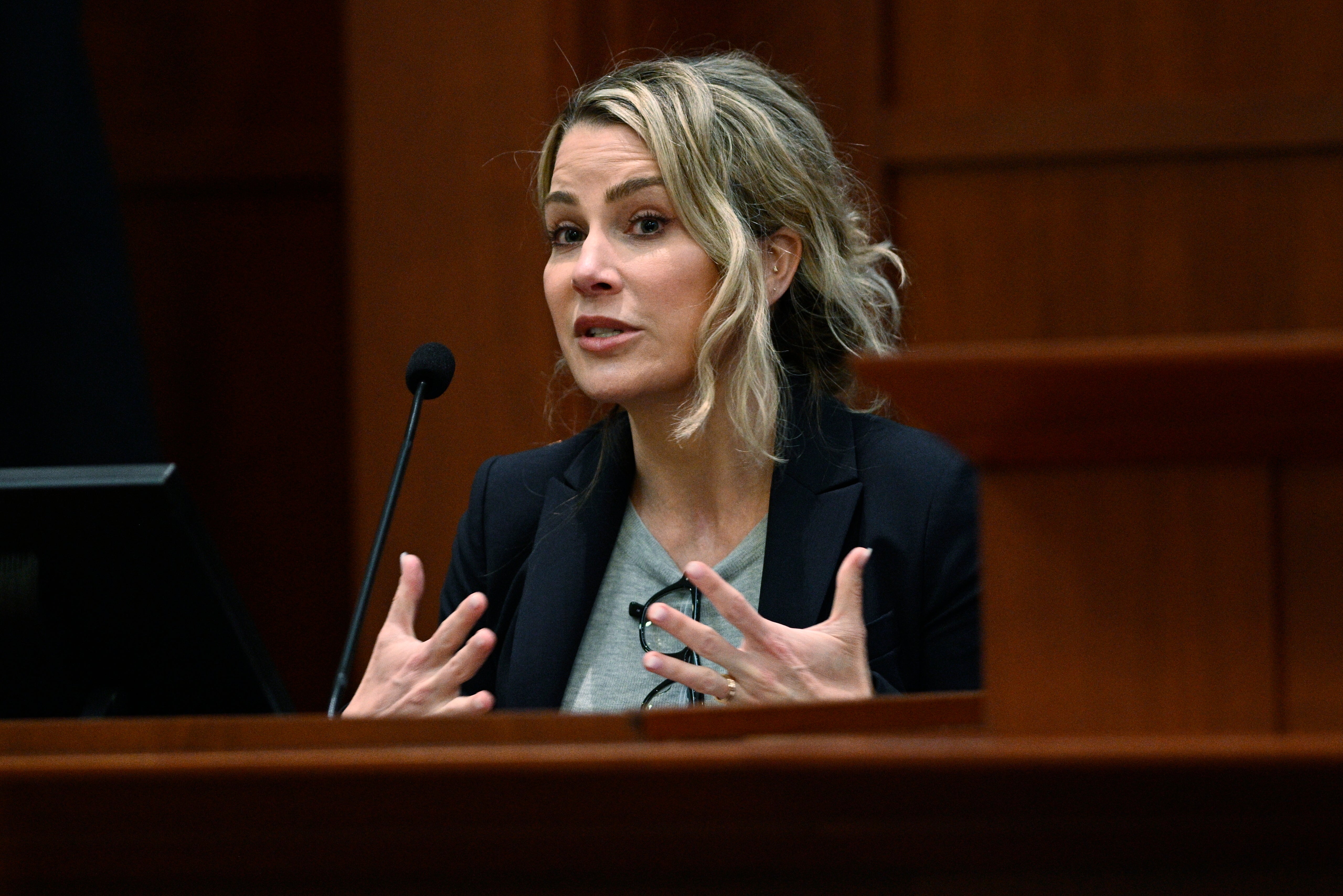Psychologist hired by Johnny Depp to analyse Amber Heard listens as defence expert refutes her testimony
Dr Dawn Hughes says Heard ‘demonstrated very clear psychological and traumatic effects’
Your support helps us to tell the story
From reproductive rights to climate change to Big Tech, The Independent is on the ground when the story is developing. Whether it's investigating the financials of Elon Musk's pro-Trump PAC or producing our latest documentary, 'The A Word', which shines a light on the American women fighting for reproductive rights, we know how important it is to parse out the facts from the messaging.
At such a critical moment in US history, we need reporters on the ground. Your donation allows us to keep sending journalists to speak to both sides of the story.
The Independent is trusted by Americans across the entire political spectrum. And unlike many other quality news outlets, we choose not to lock Americans out of our reporting and analysis with paywalls. We believe quality journalism should be available to everyone, paid for by those who can afford it.
Your support makes all the difference.The psychologist hired by Johnny Depp to analyse Amber Heard appeared in court while a defence expert refuted her testimony from the witness stand.
Dr Shannon Curry, a psychologist called by Mr Depp’s legal team, was seen sitting in the front row among other attendees as Dr Dawn Hughes, called by Ms Heard’s team, disagreed with her testimony.
The defamation trial between Mr Depp and Ms Heard began on Monday 11 April in Fairfax, Virginia following Mr Depp’s lawsuit against his ex-wife in March 2019. Mr Depp is arguing that she defamed him in a December 2018 op-ed published in The Washington Post titled “I spoke up against sexual violence — and faced our culture’s wrath. That has to change”.
Dr Curry took the stand on Tuesday 26 April, saying that she met with Ms Heard on “two separate dates” as she conducted her evaluation – 10 and 17 December 2021. She said they spent 12 hours together and that “the result of Ms Heard’s evaluation supported two diagnoses – borderline personality disorder and histrionic personality disorder”.
Dr Curry said Ms Heard “externalises blame” and can be “self-righteous”, “judgemental” and has anger.
She added that there’s a “desperate fear of abandonment” among those with borderline disorder and that the reaction to that is to try to keep a significant other close and this behaviour can become extreme.
“All of it is like pistons of an engine, kind of firing off and igniting one another,” Dr Curry said. “But when somebody is afraid of being abandoned, by their partner or by anybody else in their environment and they have this disorder, they’ll make desperate attacks to prevent that from happening.”
“And those desperate attempts could be physical aggression, it could be threatening, it could be harming themselves, but these are behaviours that are very extreme and very concerning to the people around them,” she added.
“Over time, the anger, the explosive anger, that they show when somebody is needing space, or when somebody is really not doing anything wrong, because a lot of times they read into things that they perceive as being a slight to them or being somebody intending to harm them that actually isn’t happening. They’ll exaggerate it, and they’ll explode,” Dr Curry said. “They’ll react in this heightened manner that is just exhausting for their partners.”
Dr Curry said those with borderline disorder can appear charming and socially sophisticated, but they can also blow up and be unaware of problems in their thinking.
Describing histrionic personality disorder, Dr Curry said it’s a need to be the centre of attention, adding that those with the condition will need to make up stories to put themselves at the centre as either the “victim” or “princess”.
“With histrionic personality disorder, that underlying drive is to always be the centre of attention, because if you don’t have that attention on you, it feels similar to borderline personality disorder: You feel pretty empty – like you don’t have that sense of being or value,” Dr Curry told the court.
Dr Curry said there was evidence that Ms Heard was “grossly” exaggerating symptoms of PTSD and that there was no evidence to support that she was actually suffering from the condition.
“It is one of the most easily faked disorders,” Dr Curry said. “Most of us know what it feels like to feel anxious, and a lot of people have seen war movies and movies that depict somebody having PTSD.”
“Ms Heard did not have PTSD,” she added. “And there were also pretty significant indications that she was grossly exaggerating symptoms of PTSD when asked about them.”
She said Ms Heard claimed to be suffering from 19 out of 20 of the major symptoms for post-traumatic stress disorder.
“That’s not typical of even somebody with the most disabling form of PTSD,” Dr Curry said.
Testifying for Amber Heard’s defence on 3 May, Dr Dawn Hughes said that the actress does suffer from post-traumatic stress disorder (PTSD) stemming from domestic violence.
Dr Dawn Hughes told the court that her “main opinion” is that Ms Heard’s “report of intimate partner violence” as well as the documents she was looked at in connection to the case are “consistent with what we know in the field” concerning intimate partner violence.
She also said that Ms Heard “demonstrated very clear psychological and traumatic effects” from statements made via Mr Depp’s lawyer, which have prompted Ms Heard to countersue Mr Depp.

“I diagnosed Ms Heard with Post Traumatic Stress Disorder… and the cause was the intimate partner violence by Mr Depp,” Dr Hughes said.
Dr Hughes said she spent 29 hours with Ms Heard over Zoom and in her New York City office. She said she thinks Ms Heard’s childhood affected her. The court heard earlier that Ms Heard’s parents were abusive when she was a child.

Dr Hughes said Ms Heard reported to her that Mr Depp had “pushed”, “shoved”, “slapped” and “choked” her, adding that she also claimed that he “slammed her into a wall” and kicked her.
The psychologist said Ms Heard claimed to suffer from bruises, cuts, and “vaginal pain” stemming from sexual assaults.
In her 2018 op-ed, Ms Heard wrote that “like many women, I had been harassed and sexually assaulted by the time I was of college age. But I kept quiet — I did not expect filing complaints to bring justice. And I didn’t see myself as a victim”.

“Then two years ago, I became a public figure representing domestic abuse, and I felt the full force of our culture’s wrath for women who speak out,” she added at the time.
While Mr Depp isn’t named in the piece, his legal team argues that it contains a “clear implication that Mr Depp is a domestic abuser”, which they say is “categorically and demonstrably false”. Mr Depp is seeking damages of “not less than $50m”.
Ms Heard has filed a $100m counterclaim against Mr Depp for nuisance and immunity from his allegations.




Join our commenting forum
Join thought-provoking conversations, follow other Independent readers and see their replies
Comments